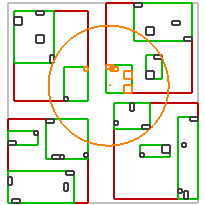 Boost
C++ Libraries
Boost
C++ Libraries
...one of the most highly
regarded and expertly designed C++ library projects in the
world.
— Herb Sutter and Andrei
Alexandrescu, C++
Coding Standards
 Boost
C++ Libraries
Boost
C++ Libraries
...one of the most highly
regarded and expertly designed C++ library projects in the
world.
— Herb Sutter and Andrei
Alexandrescu, C++
Coding Standards
Queries returns Values which meets some predicates. Currently
supported are three types of predicates:
For example queries may be used to retrieve Values:
There are three ways to perform a query presented below. All of them returns
Values intersecting some region defined as a Box.
Method call
std::vector<Value> returned_values; Box box_region(...); rt.query(bgi::intersects(box_region), std::back_inserter(returned_values));
Function call
std::vector<Value> returned_values; Box box_region(...); index::query(rt, bgi::intersects(box_region), std::back_inserter(returned_values));
Use of pipe operator generating a range
Box box_region(...); BOOST_FOREACH(Value & v, rt | index::adaptors::queried(bgi::intersects(box_region))) ; // do something with v
Queries using spatial predicates returns Values which are related
somehow to some Geometry - box, polygon, etc. Names of spatial predicates
correspond to names of Boost.Geometry algorithms. Examples of some basic
queries may be found in tables below. The query region and result Values are orange.
|
intersects(Box) |
covered_by(Box) |
disjoint(Box) |
overlaps(Box) |
within(Box) |
|---|---|---|---|---|
|
|
|
|
|
|
|
intersects(Ring) |
intersects(Polygon) |
intersects(MultiPolygon) |
|---|---|---|
|
|
|
|
To use a spatial predicate one may use one of the functions defined in boost::geometry::index namespace.
rt.query(index::intersects(box), std::back_inserter(result)); rt.query(index::covered_by(box), std::back_inserter(result)); rt.query(index::disjont(box), std::back_inserter(result)); rt.query(index::overlaps(box), std::back_inserter(result)); rt.query(index::within(box), std::back_inserter(result));
All spatial predicates may be negated, e.g.:
rt.query(!index::intersects(box), std::back_inserter(result)); // the same as rt.query(index::disjoint(box), std::back_inserter(result));
Nearest neighbours queries returns Values which are closest
to some point in space. Additionally it is possible to define how the distance
to the Value should be calculated.
The example of knn query is presented below. 5 Values nearest
to some point are orange.

There are three ways of performing knn queries. Following queries returns
k Values closest
to some point in space. For Boxes Indexables the
distance to the nearest point is calculated by default.
Method call
std::vector<Value> returned_values; Point pt(...); rt.query(index::nearest(pt, k), std::back_inserter(returned_values));
Function call
std::vector<Value> returned_values; Point pt(...); index::query(rt, index::nearest(pt, k), std::back_inserter(returned_values));
Use of operator |
Point pt(...); BOOST_FOREACH(Value & v, rt | index::adaptors::queried(index::nearest(pt, k))) ; // do something with v
The user may pass a UnaryPredicate
- function, function object or lambda expression taking const reference to
Value and returning bool. This object may be passed to the query in order
to check if Value should be returned by the query. To do it
one may use index::satisfies()
function like on the example below:
bool is_red(Value const& v) { return v.is_red(); } struct is_red_o { template <typename Value> bool operator()(Value const& v) { return v.is_red(); } } // ... rt.query(index::intersects(box) && index::satisfies(is_red), std::back_inserter(result)); rt.query(index::intersects(box) && index::satisfies(is_red_o()), std::back_inserter(result)); #ifndef BOOST_NO_CXX11_LAMBDAS rt.query(index::intersects(box) && index::satisfies([](Value const& v) { return v.is_red(); }), std::back_inserter(result)); #endif
satisfies()
may be negated, e.g.:
bool is_red(Value const& v) { return v.is_red(); } bool is_not_red(Value const& v) { return !v.is_red(); } // ... rt.query(index::intersects(box) && index::satisfies(is_red), std::back_inserter(result)); // the same as rt.query(index::intersects(box) && !index::satisfies(is_not_red), std::back_inserter(result));
It's possible to use some number of predicates in one query by connecting
them with operator&&
e.g. Pred1 &&
Pred2 &&
Pred3 &&
....
These predicates are connected by logical AND. Passing all predicates together
not only makes possible to construct advanced queries but is also faster
than separate calls because the tree is traversed only once. Traversing is
continued and Values are
returned only if all predicates are met. Predicates are checked left-to-right
so placing most restrictive predicates first should accelerate the search.
rt.query(index::intersects(box1) && !index::within(box2), std::back_inserter(result)); rt.query(index::intersects(box1) && !index::within(box2) && index::overlaps(box3), std::back_inserter(result));
Of course it's possible to connect different types of predicates together.
index::query(rt, index::nearest(pt, k) && index::within(b), std::back_inserter(returned_values)); BOOST_FOREACH(Value & v, rt | index::adaptors::queried(index::nearest(pt, k) && index::covered_by(b))) ; // do something with v
There are several ways of inserting Values returned by a query to the other R-tree container. The most basic way is creating a temporary container for Values and insert them later.
namespace bgi = boost::geometry::index; typedef std::pair<Box, int> Value; typedef bgi::rtree< Value, bgi::linear<32, 8> > RTree; RTree rt1; /* some inserting into the tree */ std::vector<Value> result; rt1.query(bgi::intersects(Box(/*...*/)), std::back_inserter(result)); RTree rt2(result.begin(), result.end());
However there are better ways. One of these methods is mentioned in the "Creation and modification" section. The insert iterator may be passed directly into the query.
RTree rt3; rt1.query(bgi::intersects(Box(/*...*/))), bgi::inserter(rt3));
If you like Boost.Range you'll appreciate the third option. You may pass the result Range directly into the constructor.
RTree rt4(rt1 | bgi::adaptors::queried(bgi::intersects(Box(/*...*/)))));